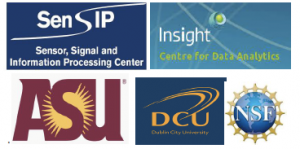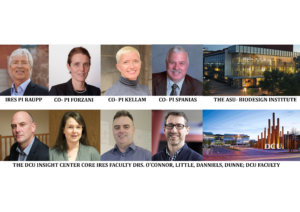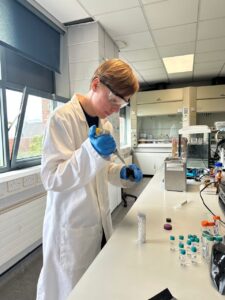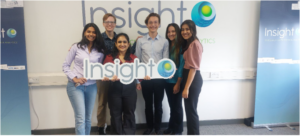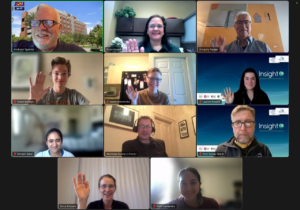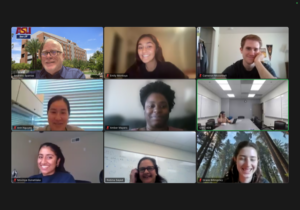NSF IRES ASU/DCU: Sensor Information Processing and Machine Learning for Wearable Devices
NSF IRES DCU Summer 2024 Schedule: May 15, 2024 – July 12, 2024
The project Ended in December 2024.
Application Form: Click Here
Application deadline is March 15, 2024 (this will be a rolling deadline until all spots are filled)
BENEFITS:
- Research in sensor and machine learning algorithms.
- Pre-training in Machine Learning at ASU before departure
- Work with experienced faculty and graduate student mentors.
- Visits to international research labs, industry and cultural sites.
- Paid travel, accommodation and per diem expenses.
- Receive a competitive research stipend.
- Meet people and gain international networking experiences.
- Exposition to European Policies and Standards on Research.
- Present research in international venues
ELIGIBILITY
Without exceptions, applicants must be:
- US citizens or permanent residents.
- Full-time students in good academic standing.
- STEM Students that have at least one more semester after the experience at their university.
- at least 18 years old by May 15 and must have a valid Passport
- Available for overseas Travel (EU COVID protocols apply)
ASU: G. Raupp (PI), A. Spanias (Co-PI and POC), E. Forzani (Co-PI), and N. Kellam (Co-PI)
DCU: N. O’Connor (POC) S. Daniels, S. Little, N. Dunne and (Research Team at DCU)
Point of Contact: A. Spanias
IRES Poster Presentations at DCU July 3, 2023
Article at DCU:
Publicity of 2023 Poster Session: Click Here
Publicity of 2022 Poster Session: Click Here
Article at ASU:
ASU published article on this program: Click Here
For more phots click here
Students Participating in the IRES DCU Program Summer 2023
Students Participating in the IRES DCU Program Summer 2022
New sensing and cloud computing capabilities in mobile platforms are creating game changing opportunities for mobile health research. A significant drawback is the lack of precision in emerging off-the-shelf mobile health products and apps. Advances in synergistic sensor and machine learning (ML) algorithm design are key to improving precision in mobile health and wearables. The aim of the IRES project is to embed students in cutting edge research that will provide integrated hardware and algorithm/software solutions for the next generation wearables and mobile health monitoring technologies. This Interdisciplinary international program will address challenges at the overlap of sensor design, big data analytics, signal processing (SP), and Machine Learning L. The IRES Track 1 program will provide opportunities for US students to collaborate internationally with researchers at the Dublin City University (DCU) Insight center. Students will be mentored by ASU and DCU faculty and will focus on solving application-driven problems involving integrated sensor devices and ML algorithms. The entire IRES program is 8 weeks and the IRES will support undergraduate and graduate students to travel for 6 weeks annually to DCU Dublin, Ireland. Intensive pre-training and post-engagement plans are provided to ensure successful outcomes. Provisions will be made (if necessary) to operate the IRES project under COVID-19 restrictions. The ASU Co-PI team brings expertise from Professors G. Raupp (sensors), E. Forzani (biomarkers), A. Spanias (ML, SP), and N. Kellam (Eng. Education). Core DCU collaborators are Professors S. Daniels (sensors), S. Little (big data, ML), N. Dune (nanosensors), and N. O’Connor (Vision, ML). The project will also engage Nobel Laureate Leland Hartwell as a thought leader for mobile health solutions. Additional faculty from both institutions will provide research mentorship and crosscutting training.
Intellectual Merit: This IRES project will focus on research and projects at the overlap of sensor device design and ML algorithm development. IRES projects will be planned in several areas including flexible sensors and ML, sensor information management and visualization, efficient deep learning, and big data analysis.
Sample projects described include:
- biomarker detection,
- big data processing,
- gait detection
- deep neural networks
- quantum computing and machine learning
- reduction of ML bias
Embedding students in DCU labs will provide knowledge on EU and global research practices, standards, and policies. Students will build their own international network and will present their work beyond US borders. The program will include culture preparation at ASU and DCU.
The prospect of research in ‘hot’ areas at a modern facility will enable us to recruit a strong and diverse student cohort. Workshops at ASU and DCU will train IRES participants to: a) present their innovations in global settings, b) communicate with international stakeholders, c) become culturally and geographically aware of global interactions. Industry engagement at ASU and DCU will provide feedback and annual external evaluation will assess progress and outcomes across all IRES activities.
Project sponsored by NSF OISE award 2107439.
IRES Participants Summer 2024:
Carly Jazwin, Computer Science. Works on: Implementing New Machine Learning Models in Tissue Engineering. The project was completed. She produced and presented a final IRES report – after her arrival at ASU.
Elevator Pitch Slide
Sarah Maisha, Computer Science, Image Segmentation of Bone Scaffolds and Cells. The project was completed. She produced and presented a final IRES report – after her arrival at ASU.
Elevator Pitch Slide
ShahNawaz Syed, Computer Science, Applications of Deep Learning to MRI Imagery. The project was completed. He produced and presented a final IRES report – after his arrival at ASU.. He was co-author on a submitted journal paper in the Fall of 2024.
Elevator Pitch Slide
Junayd Lateef, Computer Science, Utilizing Deep Learning to Detect Different Types of Brain Tumors. e produced and presented a final IRES report – after his arrival at ASU. He was co-author on a submitted journal paper in the Fall of 2024.
Elevator Pitch Slide
Yasmine Sleiman, Biomedical Engineering, presentation at ASU in mid August. The project was completed. She produced and presented a final IRES report – – after her arrival at ASU.
Elevator Pitch Slide
Megan Murphy, Imaging System for Lab on a Disc Protein Assay. She produced and presented a final IRES report – after her arrival at ASU.
Elevator Pitch Slide
IRES Participants Summer 2023:
Asher Hendricks, ASU School of SEMTE, Topic Sensors for Copper and Iron Detection in Water
Report: Sensors for Copper and Iron Detection in Water
Elevator Pitch Slide | Poster
Anvitha Doddipalli, ASU School of SBHSE, Topic EEG Denoising in a Passive Hybrid BCI with Deep Learning
Report: EEG Denoising in a Passive Hybrid BCI with Deep Learning
Elevator Pitch Slide | Poster
Owen Krueger, ASU School of SCAI, Topic Adapting NU-ResNet and NUMO-ResNet for Peptide Stability Prediction
Report: Adapting NU-ResNet and NUMO-ResNet for Peptide Stability Prediction
Elevator Pitch Slide | Poster
Dhrasti Dalal, ASU School of SBHSE, Topic Classification of Treadmill Running Fatigue Using Neural Networks
Report: Classification of Treadmill Running Fatigue Using Neural Networks
Elevator Pitch Slide | Poster
Yumi Lamansky, ASU School of SCAI, Topic Quantum Long Short-Term Memory in Detecting Fatigue
Report: Quantum Long Short-Term Memory in Detecting Fatigue
Elevator Pitch Slide | Poster
Diwitha Rajmohan, ASU School of SBHSE, Topic Python Automation for colorimetric coloration of Iron sensors
Report: Python Automation for colorimetric coloration of Iron sensors
Elevator Pitch Slide | Poster
IRES Participants Summer 2022:
Ngan Anh Nguyen, ASU School of ECEE, Topic Improved Method for Iron Detection with Colorimetric Sensor
Report: Improved Method for Iron Detection with Colorimetric Sensor
Presentation
Amber Mayers, ASU School of SBHSE, Topic Point of Care Device for Iron Concentration Detection
Report: Point of Care Device for Iron Concentration Detection
Presentation
Cameron McConnell, ASU School of SCAI, Topic NSF IRES ASU/DCU: DCU – Move Well Being Well
Report: NSF IRES ASU/DCU: DCU – Move Well Being Well
Presentation
Emily Montoya, ASU School of SBHSE, Topic POINT OF CARE SENSORS FOR IRON DETECTION
Report: POINT OF CARE SENSORS FOR IRON DETECTION
Presentation
Grace Billingsley, ASU School of SBHSE, Topic Machine Learning For Segmentation and Classification of MRI Imaging
Report: Machine Learning For Segmentation and Classification of MRI Imaging
Presentation
Movinya Gunatilaka, ASU School of SCAI, Topic PREDICTION AND CLASSIFICATION OF CHILDREN’S VO2 MAX IN IRELAND USING MACHINE LEARNING
Report: PREDICTION AND CLASSIFICATION OF CHILDREN’S VO2 MAX IN IRELAND USING MACHINE LEARNING
Presentation
